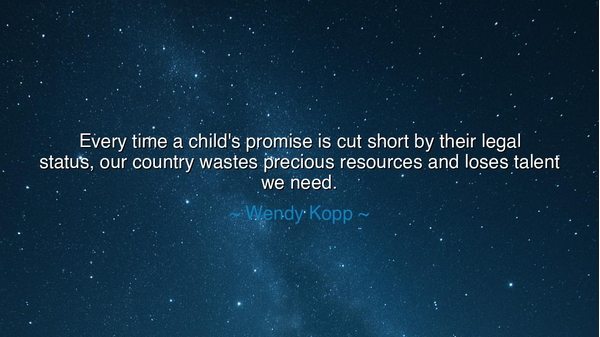
Every time a child's promise is cut short by their legal status
Every time a child's promise is cut short by their legal status, our country wastes precious resources and loses talent we need.






In the chronicles of human aspiration, few truths are as compelling and as sorrowful as the loss of potential through circumstances beyond one’s control. Wendy Kopp’s words, “Every time a child's promise is cut short by their legal status, our country wastes precious resources and loses talent we need,” illuminate a reality both moral and practical: society flourishes when its children are allowed to realize their potential, and falters when artificial barriers impede their growth. Here lies a meditation on justice, foresight, and the enduring cost of neglecting the promise of youth.
From the academies of ancient Athens to the monastic schools of medieval Europe, civilizations recognized that nurturing talent is the foundation of societal prosperity. A child denied access to education or opportunity due to birth, class, or circumstance represented not only an individual tragedy but a loss to the collective well-being. Kopp’s reflection situates this ancient principle in the modern context of legal status: when immigration laws or bureaucratic barriers prevent children from fully participating in society, the nation itself bears the cost of wasted potential and unrealized contribution.
History offers vivid illustration. In early 20th-century America, waves of immigrant children arrived with ambition and skill but faced exclusion due to restrictive laws or social prejudice. Many were prevented from attending school or pursuing professional careers. Yet those who overcame these barriers—through advocacy, legal reform, or community support—went on to enrich the nation as doctors, engineers, artists, and leaders. Kopp’s warning reminds us that each barrier denied is not merely a personal setback, but a diminishment of society’s collective talent.
Consider the modern story of a young student, brought to a country as a child, who excels academically yet is restricted from higher education due to legal barriers. Their ambition, ingenuity, and potential contribution to medicine, science, or technology remain untapped. Kopp’s words underscore the tangible loss that legal restrictions impose: resources invested in early education, mentorship, and training fail to yield the societal benefits they might have, and the nation loses citizens capable of innovation and leadership.
The philosophical resonance of her statement is profound. Justice, opportunity, and prosperity are intertwined. When the potential of youth is constrained by circumstance, society fails both ethically and pragmatically. The moral imperative is to ensure that every child—regardless of legal classification—can contribute according to their ability. The ancients understood this principle implicitly: the flourishing of the polis depends upon the cultivation and protection of its future citizens.
Practically, Kopp’s reflection demands action. Advocate for equitable legal frameworks, support policies that expand educational access, and recognize the latent talent in every child, irrespective of status. Communities, schools, and governments must strive to dismantle barriers that prevent youth from realizing their promise, understanding that every lost opportunity diminishes the collective strength of society.
This lesson extends beyond immigration or legal status. Any systemic barrier—economic, social, or institutional—that curtails potential is a theft from the future. Recognizing the intrinsic value of every child’s talent, and providing the means for its cultivation, strengthens society as a whole. Each life allowed to flourish multiplies the capacity for innovation, leadership, and collective advancement.
Thus, Wendy Kopp’s words echo as a timeless teaching: to deny opportunity to children because of legal or arbitrary barriers is to waste resources, diminish potential, and weaken the fabric of society. Let this reflection guide policymakers, educators, and citizens alike, reminding us that the true measure of a nation is found in the care, cultivation, and empowerment of its youth. In nurturing promise, we secure not only justice but the enduring prosperity of generations to come.






AAdministratorAdministrator
Welcome, honored guests. Please leave a comment, we will respond soon